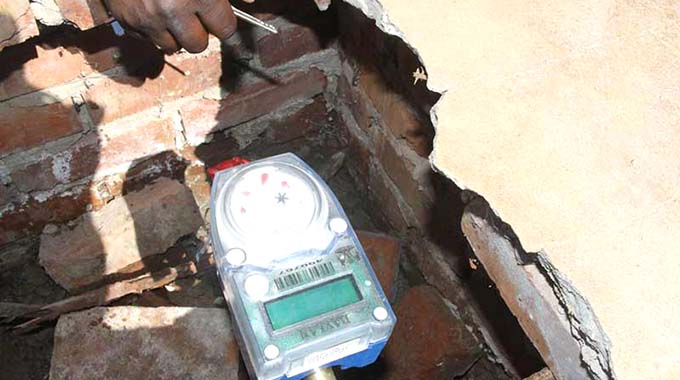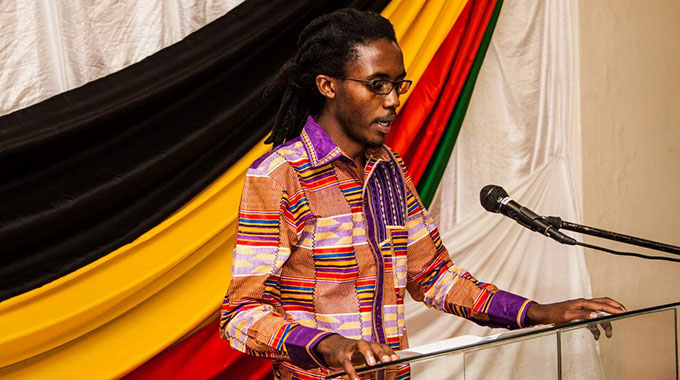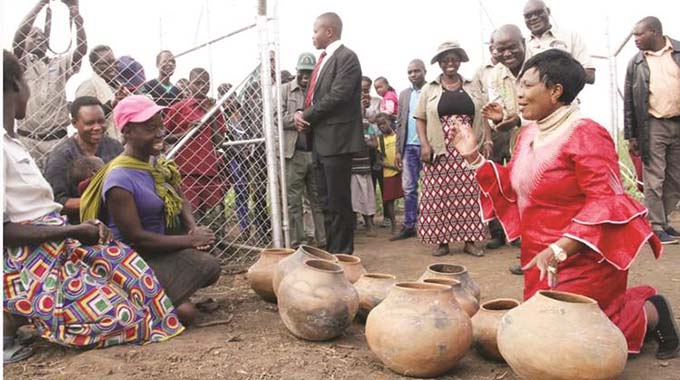Zinwa prepaid water ready by September

Golden Sibanda Senior Business Reporter
The Zimbabwe National Water Authority (Zinwa) will introduce prepaid water system for all local authorities by September this year and institute stop order payment arrangements for other bulk water consumers (farmers) in order to rein in problem debtors.
Acting chief executive Engineer Taurai Maurukira, told Zinwa’s annual general meeting (AGM) in Harare yesterday that the water authority was owed $112 million as at December 2017 from $146 million in the same period the prior year.
“We have successfully awarded three contracts for the supply of prepaid meters. This (prepaid system) should come online by September 2018. With that, we should see a huge impact on revenue collection efforts of the authority,” he said.
Eng Maurukira said the proposal for the prepaid revenue collection system was made a long time ago, but the implementation of the initiative had taken long due to the need to secure a software compatible with Zinwa’s billing system.
Further, the Procurement Regulatory Authority of Zimbabwe (PRAZ) had picked out issues in the tenders for the prepaid water system Zinwa intended to introduce, which the procurement authority felt would cause problems in future.
The prepaid water system, Eng Maurukira pointed out, was crafted mainly to deal with bulk water consumers who were giving the authority problems in collecting the revenue. Revenue amounted to $67,7 million in 2017 from $55,4 million in 2016.
The growth in revenue represented a 22 percent growth on the prior year comparative, having recovered from the drawback of the floods during the 2016/17 season, which affected the consumption of raw water by its consumers.
The prepaid water system by Zinwa, praised by the Office of the President and Cabinet for progress it has made towards conformity with dictates of the Public Entities and State Enterprise Management Act, is mainly targeted at problem areas.
“The intention or the target are the problem areas on revenue collection; those that have been causing deterioration in our revenue collections,” Eng Maurukira said.
“A major challenge still remains with
local authorities who owed the authority a total of $34 million as at December 31, 2017, translating to 30 percent of the total debtors’
amount.”
The prepaid water system will allow the national water authority to charge for current water consumption while also recovering, over time, the outstanding debt.
“Irrigators (commercial farmers) owed a total of $36 million, which translates to 32 percent of the total amount owned,” Eng Maurukira told the AGM yesterday.
Eng Maurukira said with regard to irrigators, essentially made up of commercial farmers; the water authority would introduce a stop order payment system on current consumption while for legacy debts it would pursue engagement with debtors.
The water authority said its clear water sales totalled $35,6 million in 2017 from $37 million in the same period of 2016, representing a decline of 3,8 percent due to the 2016 /17 season flooding, which reduced the need for supplementary irrigation.
“Obsolete pumping equipment with reduced output and efficiency also affected the clear water supply capacity for the authority. As a way to mitigate this, $2 million has been set aside in 2018 for rehabilitation of clear water plant and equipment.”
Zinwa’s Head (Raw Water) Engineer Albert Mare, the $2 million budget will reduce clear water losses, along the way to consumers, from 52 percent to about 30 percent. The funds will address problems at 30 out of 500 clear water pump stations.
Raw water sales were almost constant in 2017 at $11,7 million from $11,8 million in 2018. Eng Maurukira said the water authority had recovered, financially, from the setback caused by Government directed debt forgiveness in October 2013.
This financial setback saw the authority run up a debt of 11 months’ salary arrears, which amounted to over $3 million, which it managed to clear by December 2017.
Last year, Zinwa resumed a number of capital projects, which had stalled due to funding challenges. Among the projects was the Gwayi Shangani, now at 27 percent completion, where significant works have been covered.










Comments